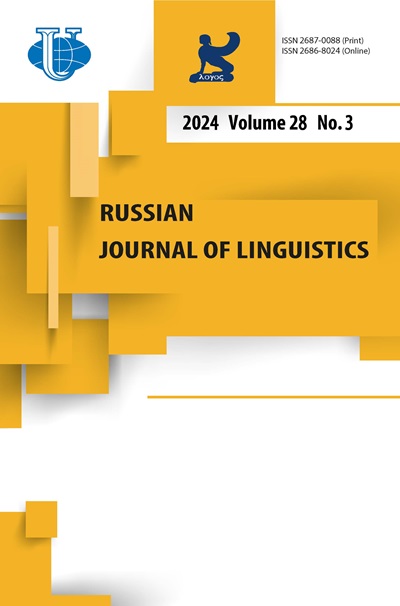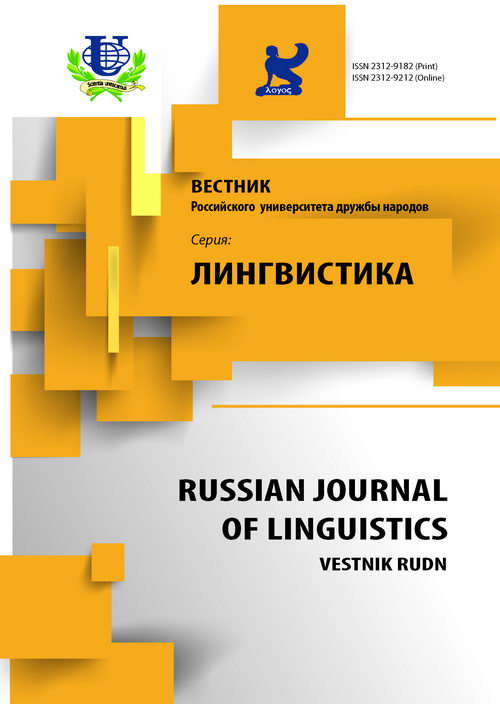Грамматические структуры в межкультурных сравнениях
- Авторы: Гладкова А.Н1
-
Учреждения:
- Университет Брайтона
- Выпуск: Том 19, № 4 (2015)
- Страницы: 57-68
- Раздел: Статьи
- URL: https://journals.rudn.ru/linguistics/article/view/9258
Цитировать
Полный текст
Аннотация
На материале русского и английского языков в статье обсуждается вопрос о том, как культурная информация передается на уровне грамматики. В данном случае грамматика рассматривается в неразрывной связи с семантикой и прагматикой. Исследование проведено в рамках этносинтаксиса. В работе анализируются безличные конструкции в русском языке и конструкции причины в английском. Также на примере речевого акта «просьба» в английском и русском языках рассматриваются различия в употреблении грамматических структур, вызванные культурными факторами. В качестве источника примеров используются Национальный корпус русского языка и Коллинз Вордбанкс Онлайн. В статье подчеркивается практическая важность лингвистических исследований, выявляющих культурный компонент значения, для преподавания иностранных языков.
Об авторах
Анна Н Гладкова
Университет Брайтона
Email: angladkova@gmail.com
Факультет гуманитарных наук
Список литературы
- Apresjan, V. (2012) ‘The ‘Russian’ attitude to time’, in L. Filipovic and K. Jaszczolt (ed.) Space and Time across Languages and Cultures. Vol. II: Language, Culture and Cognition, Amsterdam: John Benjamins, pp. 103-120.
- Austin, J.L. (1962) How to Do Things with Words, Oxford: Oxford University Press.
- Bowe, H. and Martin, K. (2009) Communication Across Cultures: Mutual understanding in a global world, Cambridge: Cambridge University Press.
- Bromhead, H. (2009) The Reign of Truth and Faith: Epistemic expressions in 16th and 17th century English, Berlin: Mouton de Gruyter.
- Cobuild Wordbanks Online http://www.collinslanguage.com/content-solutions/wordbanks.
- Enfield, N.J. (2002) ‘Ethnosyntax: Introduction’, in N.J. Enfield (ed.) Ethnosyntax: Explorations in Grammar and Culture, Oxford: Oxford University Press, pp. 3-30.
- Enfield, N.J. (ed.) (2002) Ethnosyntax: Explorations in Grammar and Culture, Oxford: Oxford University Press.
- Gladkova, A. (2012) ‘Universals and specifics of ‘time’ in Russian’, in L. Filipovic and K. Jaszczolt (eds.) Space and Time across Languages and Cultures. Vol. II: Language, Culture and Cognition, Amsterdam: John Benjamins, pp. 167-188.
- Gladkova, A. (2013a) ‘“Is he one of ours?” The cultural semantics and ethnopragmatics of social categories in Russian’, Journal of Pragmatics, 55: 180-194.
- Gladkova, A. (2013b) ‘“Intimate” talk in Russian: human relationships and folk psychotherapy’, Australian Journal of Linguistics, Special issue “Semantics and/in social cognition”, edited by C. Goddard, 33(3): 322-344.
- Goddard, C. (2002) ‘Ethnosyntax, Ethnopragmatics, Sign-Function, and Culture’, in N.J. Enfield (ed.) Ethnosyntax: Explorations in Grammar and Culture, Oxford: Oxford University Press, pp. 52-73.
- Goddard, C. (2003) ‘Whorf meets Wierzbicka: variation and universals in language and thinking’, Language Sciences, 25: 393-432.
- Goddard, C. (2006) ‘Ethnopragmatics: A new paradigm’, in C. Goddard(ed.) Ethnopragmatics: Understanding discourse in cultural context, Berlin: Mouton de Gruyter, pp. 1-30.
- Goddard, C. (ed.) (2006) Ethnopragmatics: Understanding discourse in cultural context, Berlin: Mouton de Gruyter.
- Goddard, C. and Wierzbicka, A. (2014) Words and Meanings: Lexical semantics across domains, languages and cultures. Oxford: Oxford University Press.
- Goddard, C. and Wierzbicka, A. (Eds.) (2002) Meaning and Universal Grammar: Theory and empirical findings. Vols. I, II, Amsterdam: John Benjamins.
- Gumperz, J. and Hymes, D. (1972) Directions in sociolinguistics: The ethnography of communication, New York: Holt, Rinehart and Winston.
- Larina, T. (2009) Kategorija vežlivosti i stil’ kommunikacii. [The category of politeness and styles of communication], Moscow: Jazyki slavjanskix kul’tur.
- Larina, T. (2013) Angličane i russkie: jazyk, kul’tura, kommunikacija. [The English and the Russians: Language, culture and communication], Moscow: Jazyki slavjanskix kul’tur.
- Malchukov, A. and Ogawa, A. (2011) ‘Towards a typology of impersonal constructions: A semantic map approach’, in A. Malchukov and A. Siewierska (eds.) Impersonal Constructions: A cross-linguistic perspective, Amsterdam: John Benjamins, pp. 17-54.
- Russian National Corpus www.ruscorpora.ru.
- Searle, J.R. (1969) Speech Acts, Cambridge: Cambridge University Press.
- Searle, J.R. (1979) Expression and Meaning: Studies in the Theory of Speech Acts, Cambridge: Cambridge University Press.
- Simpson, J. (2002) ‘From Common Ground to Syntactic Construction: Associated Path in Warlpiri’, in N.J. Enfield (ed.) Ethnosyntax: Explorations in Grammar and Culture, Oxford: Oxford University Press, pp. 287-307.
- Wierzbicka, A. (1979) ‘Ethnosyntax and the philosophy of grammar’, Studies in Language, 3(3): 313-83.
- Wierzbicka, A. (1988) The Semantics of Grammar, Amsterdam: John Benjamins.
- Wierzbicka, A. (1992) Semantics, culture, and cognition: Universal human concepts in culture-specific configurations, Oxford: Oxford University Press.
- Wierzbicka, A. (1999) Emotions across languages and cultures: Diversity and universals, Cambridge: Cambridge University Press.
- Wierzbicka, A. (2002) ‘English causative constructions in an ethnosyntactic perspective: Focusing on LET’, in N. J Enfield (ed.) Ethnosyntax: Explorations in Grammar and Culture, Oxford: Oxford University Press, pp. 162-203.
- Wierzbicka, A. 2003[1991]. Cross-Cultural Pragmatics. 2nd ed. Berlin: Mouton de Gruyter.
- Wierzbicka, A. (2006) English: Meaning and Culture, Oxford: Oxford University Press.
- Zalianiak, Anna. (2005) ‘Zametki o slovax obščenie, otnošenie, pros’ba, čuvstva, ėmocii’. [Notes about the words obščenie, otnošenie, pros’ba, čuvstva, ėmocii]. In A. Zalizniak. et al. Ključevye idei russkoj jazykovoj kartiny mira. Moskva: Jazyki slavjanskoj kul’tury.

















